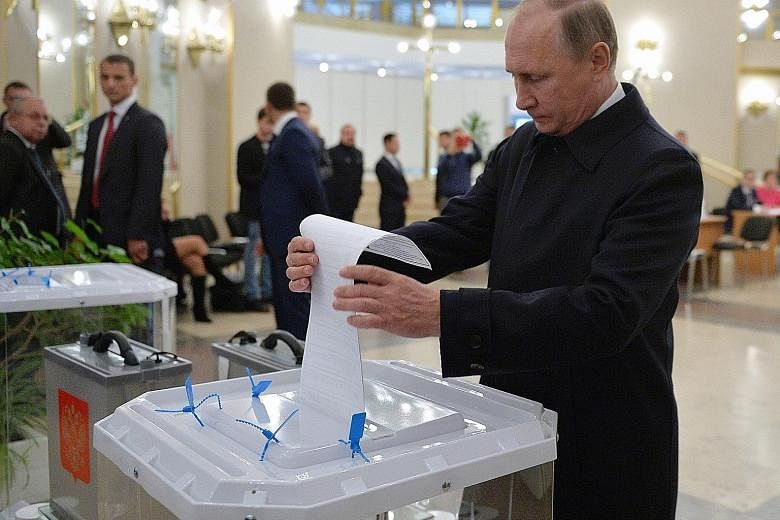MOSCOW • Russia's ruling United Russia party has cruised to an easy victory in parliamentary polls that could pave the way for President Vladimir Putin to glide into a fourth term in 2018 elections.
With 93 per cent of votes counted, it secured at least 343 seats in the 450-member Duma, or Lower House of Parliament, up from 238 previously, results announced yesterday by the election commission showed.
According to the near-complete official vote count, the Communists were on track to come second with 42 seats, the populist LDPR party third with 41, and the left-of-centre A Just Russia party fourth with 21 seats. All three of those parties tend to vote with United Russia on crunch issues and avoid direct criticism of Mr Putin.
Liberal opposition parties failed to win any seats, after holding just one before.
Mr Putin, 63, speaking to United Russia campaign staff a few minutes after polling stations closed on Sunday night, said the win showed that voters still trusted the leadership despite an economic slowdown made worse by Western sanctions over Ukraine.
Mr Putin's aides are likely to use the result as a springboard for his own campaign for re-election in 2018, although he has not yet confirmed that he will seek another term.
Mr Putin, when visiting the United Russia headquarters with his ally, Prime Minister Dmitry Medvedev, who is also the party's leader, said: "We can say with certainty that the party has achieved a very good result; it has won."
Alluding to the spluttering economy, which is forecast to shrink this year by at least 0.3 per cent, Mr Putin said: "We know that life is hard for people. There are lots of problems, lots of unresolved problems. Nevertheless, we have this result."
The Kremlin narrative, frequently repeated on state television, accuses the West of using sanctions to try to wreck the economy in revenge for Moscow's seizure of Crimea, the Ukrainian region it annexed in 2014.
There were widespread reports of voting irregularities.
Golos, an independent monitoring group, said it received almost 700 complaints, such as ballot stuffing and multiple voting, including one in which a bus full of workers was seen at seven polling stations in Moscow.
Reuters reporters at one polling station in the Mordovia region of central Russia witnessed several people casting their ballot, then coming back later and voting again.
Cameras monitoring polling stations caught officials at several of these slipping papers into ballot boxes while no member of the public was nearby.
Election chiefs maintained there was no evidence of large-scale cheating but promised to investigate allegations. After the last election, anger at ballot-rigging prompted large protests in Moscow.
Election officials said that as of 6pm Moscow time (11pm Singapore time), two hours before polling stations in the capital closed on Sunday, the turnout was 39.4 per cent, substantially lower then the 60 per cent turnout at the last parliamentary election. There was other evidence of voter apathy across Russia's 11 time zones, from the Pacific Ocean to the Baltic Sea.
United Russia benefits from its association with Mr Putin, who, after 17 years in power as either president or prime minister, enjoys a personal approval rating of about 80 per cent, opinion polls show.
Most voters do not see any viable alternative to Mr Putin and his allies, and they fear a return to the chaos and instability of the 1990s, the period immediately after the collapse of the Soviet Union, if his rule ends.
REUTERS, BLOOMBERG, NYTIMES, AGENCE FRANCE-PRESSE

